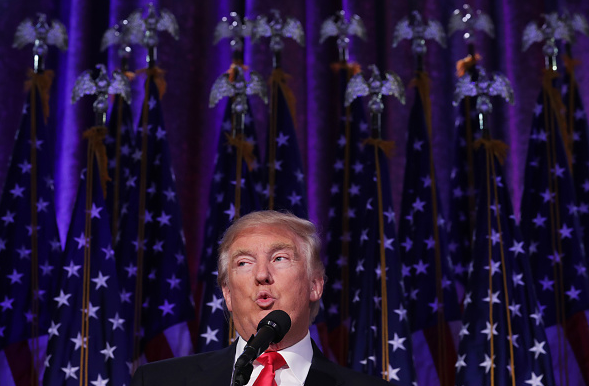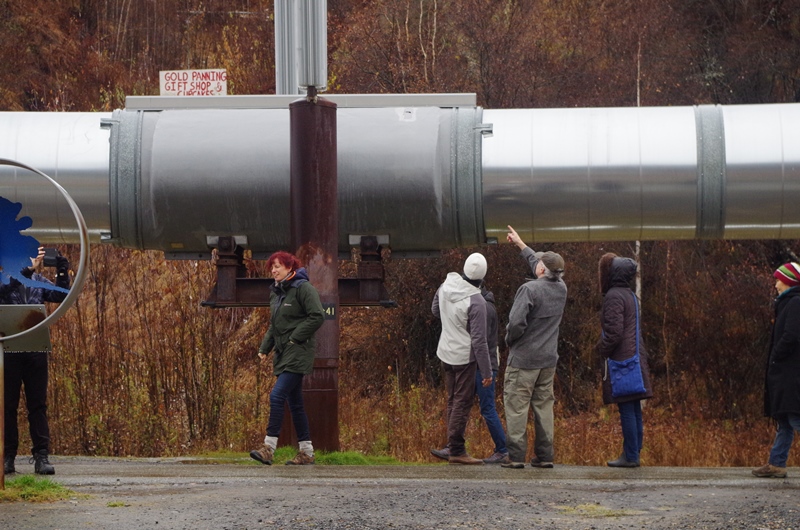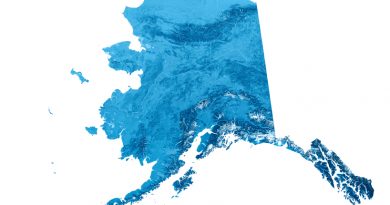Blog: Trump’s election a cold reality check for Arctic

Today, half of America woke up feeling overjoyed that finally, their voices had been heard.
The other half felt sickened, defeated, and deeply concerned at what the next four years hold. Donald Trump’s victory in the U.S. presidential election promises a lot of change at home and abroad. For the Arctic, his presidency does not bode well – but at the end of the day, there may be hope. Here are four damaging outcomes a Trump presidency could have for the Arctic, along with a few possible silver linings.
Health care for Alaska Natives
In the 1990’s, Trump repeatedly warred with Native American tribes as they built casinos on their land across the country that threatened his hold on the industry. Today, Trump’s promise to repeal the Affordable Care Act (ACA) may spell disaster for the many Alaska Natives who have come to rely on it. Trump’s threat to repeal Obamacare is not an empty one: the 22 million people covered by it, mostly through Medicaid and insurance marketplaces, could end up uninsured. Some of these people are inevitably Alaska Natives. On average, this group has poor health compared to other Alaskans, including higher risks of mental health issues, suicide, diabetes, and obesity, and generally faces more difficult access to health care facilities. Nationwide, 30% of Native Americans are uninsured compared to other Americans.
Prior to Obamacare, pre-existing treaties between Natives and the federal government guaranteed health care, which was delivered by the Indian Health Service. Yet the program was poorly funded and hard to access for Native peoples living off-reservation and in cities, away from tribal health facilities. ACA, commonly referred to as Obamacare, expanded coverage for Alaska Natives and Native Americans and also exempted them from having to pay the fee if they did not sign up for insurance. Alaska is also one of the states that has expanded Medicaid under Obamacare. If Obama’s signature health plan disappears, it’s not clear what will replace it. Any gap in coverage for Alaska Natives, an already vulnerable population, will represent a blow to Arctic health at large.
Climate change denial
Trump has denied climate change, calling it a hoax perpetrated by the Chinese to render U.S. manufacturing uncompetitive. Climate change may well be intensifying due to Chinese actions: the country accounts for 10% of all emissions released since industrialization began in 1750 and is now the world’s largest emitter of greenhouse gases. But climate change is not a hoax, and China’s cooperation is crucial for stemming the release of emissions into the atmosphere. Yet when President Obama leaves office, the world can likely say goodbye to bilateral efforts between the U.S. and other nations on climate change such as the U.S.-China Joint Announcement on Climate Change or the U.S.-Canada Joint Statement on Climate, Energy, and Arctic Leadership. Multilateral agreements like the historic Paris Agreement reached at COP 21 could even be thrown out the window if Trump follows through on his threat to “cancel”the international agreement.
So in short, whereas the White House released a joint statement in November 2014 with China that said the following,
“The United States of America and the People’s Republic of China have a critical role to play in combating global climate change, one of the greatest threats facing humanity. The seriousness of the challenge calls upon the two sides to work constructively together for the common good.”
Trump tweeted this in November 2012:

Fast forward to November 2016, and president-elect Trump has just appointed notorious climate change skeptic Myron Ebell to head up the transition team for the Environmental Protection Agency. With science deniers such as him in charge of government agencies, there’s likely to be a brain drain from government. Top scientists and environmentalists will not want to work in bureaus and agencies that ultimately report to Trump. This may have damaging consequences for drafting informed policy about a fast-changing Arctic. Even worse, Trump’s desire to tear up methane restrictions that have been proposed for oil and gas producers could speed up global warming, since methane’s impact is 100 times greater than a molecule of carbon dioxide over a 100-year period. With the U.S. having overtaken Russia as the world’s biggest producer of gas, one would think we have a responsibility to frack and drill responsibly – but not Trump.
Arctic offshore drilling: Revived hopes in Alaska and Russia?
Trump is a champion of an “all-of-the-above” energy policy, which promotes fossil fuels alongside renewables like wind and solar. He wants to produce more oil and more coal, even though the U.S. already has a glut of the viscous fossil fuel and the rocky one is essentially dead on arrival as utility companies switch to natural gas for power generation.
Trump’s pro-drilling stance will sit well in oil-rich Alaska, where most in the state, including many Alaska Native corporations and their shareholders, support the expansion of offshore drilling in the Beaufort and Chukchi Seas. Trump would have to do a lot in the way of providing subsidies in order to encourage corporations like Shell to come back, however. At around $44, the current price of a barrel of oil is far too low to make offshore drilling in the Alaskan Arctic sensible. OPEC released a report yesterday estimating that the price of oil would still only recover to $60 by 2020, meaning that U.S. Arctic offshore drilling may remain tabled throughout Trump’s term. But his election may mean an easing of U.S. sanctions on Russia, which could lead to the re-entry of U.S. companies like ExxonMobil into the Russian Arctic offshore. Sanctions forced the company to exit from its joint drilling project with Russian oil company Rosneft in the Kara Sea in October 2014.
Trump’s triumph also presents a new roadblock to protesters and defenders of water rights in Standing Rock, North Dakota. President Obama, who has generally refrained from commenting on the issue, said last week that the government was “going to let it play out for several more weeks, and determine whether or not this can be resolved in a way that I think is properly attentive to the traditions of the first Americans.” While many have criticized Obama for his failure to intervene, Trump would probably ink a deal with Energy Transfer Partners in no time.
Neo-isolationism and the Arctic Council
The U.S. is the current chair of the Arctic Council, which it has overseen under a motto of “One Arctic: Shared Opportunities, Challenges, and Responsibilities.” Trump’s “America First” agenda of neo-isolationism, however promises to roll back the country’s commitments to what are perceived as unnecessary overseas entanglements, from South Korea to Europe. The Arctic may be one such region where the incoming White House team chooses to downscale the country’s efforts. But still, Trump’s forthcoming inauguration on January 20, 2017 means that his administration will have to oversee the last four months of the U.S. Arctic Council chairmanship. The 10th Ministerial Meeting, where the U.S. will pass the baton to Finland, will take place on May 11 in Fairbanks, Alaska. The Obama Administration sent Secretaries of State John Kerry and Hillary Clinton to various Arctic meetings. They were the highest-ever ranking U.S. representatives to be involved in these forums. In contrast, Trump may send a low-ranking climate change skeptic in their stead and raise a banner of “America First” instead of “One Arctic.” Seriously, can you imagine one Trump’s supposed top picks for secretary of state, Newt Gingrich, going to an Arctic Circle meeting?
Regardless of who Trump sends (if anyone), most other Arctic states will probably agree that the chairmanship can’t pass to Finland soon enough. And after the U.S. chairmanship comes to a close, for the Arctic’s sake, a continuation of the historic U.S. negligence of northern affairs rather than active intervention by the Trump administration may be preferable.
Are there any silver linings?

Many Americans probably feel that they are living in an alternate universe whose Trumpian reality they refuse to believe. But his election must be accepted and met head-on. As Secretary Clinton remarked this morning during her concession speech, “We owe him an open mind and the chance to lead.” We must also look for some of the positives that may come out of the election for the Arctic.
- U.S. Relations with Russia may well improve, which could enhance cooperation between the two countries in the Arctic. Trump suggested back in May that he would consider recognizing Crimea as part of Russia, and President Vladimir Putin was among the first world leaders to congratulate Trump.
- Trump’s sub-Arctic roots: The tiny town of Bennett, British Columbia, where Trump’s German grandfather tried his hand at running a brothel and restaurant called the Arctic Hotel during the heady days of the Yukon Gold Rush, may see an influx of tourists. The Carcross Tagish First Nation has been planning to capitalize on the local Trump history and build a resort in what is now a ghost town.
- Arctic infrastructure: Trump has vowed to spend “at least double” the $275 billion Hillary Clinton had proposed to spend on infrastructure over the next five years on projects such as roads, bridges, and ports. He’s also especially keen to build more pipelines, including Keystone XL, and “approve private sector energy infrastructure projects.” While pipelines are a dead end in terms of leading towards an energy transition, at least their construction may temporarily employ people in places like Alaska.
- Galvanizing popular action on climate: As my colleague Scott Stephenson wrote from the United Nations COP 22 conference in Marrakech, Morocco, protesters who had anticipated presenting a “presidential to-do list” on climate change hastily turned it into a “people’s to-do list.” This kind of attitude is healthy regardless of whether or not Clinton or Trump had been elected. Climate change is a global problem that cannot be solved by the U.S. president alone, no matter how great his illusions of grandeur are. Globe-spanning environmental issues must be tackled by the world’s people coming together. Trump may have divided the U.S. electorate during the campaign, but if his election serves to truly bring people together and galvanize the fight against climate change, then something positive may be made out of what many view as a devastatingly low moment in the history of America.
Since the Civil War, more liberal-minded Americans, often war resisters and draft dodgers, have fled to Canada. This may happen again, with Trump-loathing U.S. citizens crossing the border north for Prime Minister Justin Trudeau’s warm embrace. But for many concerned Americans, the choice is to stay home and work for a better country and a better Arctic – even though the road ahead may be long, tough, and frigid.
Never doubt that a small group of thoughtful, committed citizens can change the world; indeed, it’s the only thing that ever has. – Margaret Mead
This post first appeared on Cryopolitics, an Arctic News and Analysis blog.

Related stories from around the North:
Canada: Trudeau and Obama’s Arctic endeavours, Deutsche Welle’s Ice-Blogger
Denmark: Obama and Nordic leaders pledge Arctic cooperation, Alaska Dispatch News
Finland: UN rep. urges suspension of Sámi elections, Yle News
Greenland: Greenland, Alaska elections bolster Arctic resource extraction, Blog by Mia Bennett
Iceland: Iceland’s Pirate Party leads polls few days before elections, The Independent Barents Observer
Russia: Russian Foreign Ministry dismisses Supo property fears as Russophobia, Yle News
Sweden: Land, water rights big issues in Sweden’s Sami elections, Radio Sweden
United States: Alaska Senator Lisa Murkowski cruises to 3rd term in US Senate, Alaska Dispatch News



